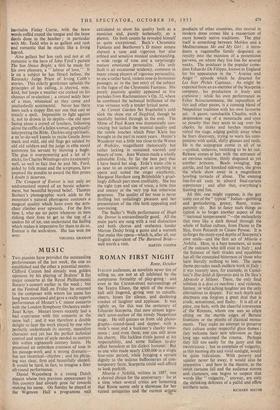MUSIC
Two pianists have provided the outstanding performances of the last week, the one an established and the other a potential master. Clifford Curzon. had already won golden opinions by his playing of Brahms' B flat major concerto at the Royal Philharmonic Society's concert earlier in the week ; but at the Festival Hall on Friday he returned to the composer with whom his name has long been associated and gave a really superb performance of Mozart's C minor concerto with the London Symphony Orchestra under Josef Krips. Mozart lovers recently had a bad experience with this concerto in the same hall ; and it was therefore a double delight to hear the work played by one who perfectly undersfands its stormy, masculine character and yet has the perfect technical control and sense of style needed to contain this within eighteenth century limits. He preserved an unbroken evenness of tone in his passage-work and a strong dramatic— but not theatrical—rhythm ; and his phras- ing was clear, firm and beautifully shaped. It would be hard, in fact, to imagine a finer all-round performance.
Daniel Wayenberg is a young Dutch pianist whose two previous appearances in this country had already gone far towards making his name. On Sunday he played at the Wigmore Hall a programme well
calculated to show his quality both as a musician and, purely technically, as a pianist. On both counts he revealed himself as quite exceptional. Bach's Chromatic Fantasia and Beethoven's D minor sonata showed a sane and vigorous but also refined and sensitive musical understanding, a wide range of tone and a surprisingly mature emotional personality. His only fault is an occasional tendency, common in many young players of vigorous personality, to use a rather hard, violent tone in fortissimo passages, as in the last entry of the subject in the fugue of the Chromatic Fantasia. His purely pianistic quality appeared in five preludes from Rachmaninov's Op. 32, where he combined the technical brilliance of the true virtuoso with a tender lyrical sense. .
At Covent Garden Set Svanholm's cold took the shine out of Siegfried, though he manfully battled through to the end. The Mime of Paul Kuen was dramatically con- vincing but lacked the musical quality and the subtle touches which Peter Klein has brought to the part in recent years. Hotter's Wanderer was a little too close to the Wotan of Walk lire, magnificent rhetorically but rather lacking in sustained warmth and beauty of tone. Jean Watson made a wholly admirable Erda, by far the best part that I have heard her sing. Erda's static role is as near to an oratorio .part as anything in opera and suited the singer excellently. Margaret Harshaw sang Brlinnhilde's gruel- lingly difficult part most creditably. She has the right type and size of voice, a little thin and uneasy at the very top but otherwise generous. The quality of her tone is never thrilling but unfailingly pleasant and her presentation of the role both appealing and' convincing.
The Sadler's Wells performance of Hugh the Drover is extraordinarily good. All the main parts are sung with a real distinction and both chorus and orchestra (under Marcus Dods) bring a gusto and a warmth that make this opera—which is, after all, our English equivalent of The Bartered Bride—


































 Previous page
Previous page